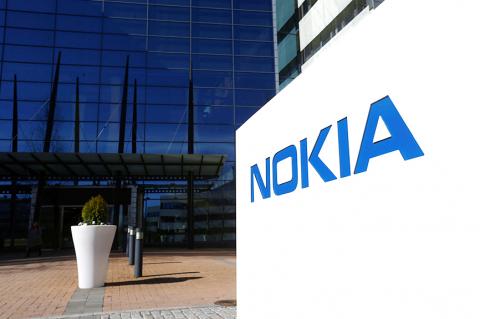Wireless equipment maker Nokia Oyj reported an unexpected quarterly loss as it took an early hit in the battle to supply the next generation of mobile networks.
The results make it harder for Nokia to meet its earnings targets for this year and the Finnish vendor said it was now under “significant pressure on execution in the second half.”
Its shares fell as much as 10 percent, their steepest intraday drop since October 2017.

Photo: Reuters
The loss contrasts with an improved performance by its Swedish rival Ericsson AB.
While both companies are trying to clinch 5G customers at low prices in the hope they can sell more to them later, Ericsson still published stronger-than-expected results last week.
Nokia and Ericsson are also trying to capitalize on the woes of Chinese rival Huawei Technologies Co (華為), which faces headwinds in several countries over concerns that its equipment could be used for state-sponsored espionage.
Britain is expected to become the latest Western country to announce measures that could make it tougher for Huawei to do business.
However, the benefits for its two main rivals could take years to emerge as all three jostle for vital early contracts on 5G that would help them to lock in longer-term revenue.
“The first quarter was really weak, but still it’s the same story that at the end of the year it will take off at a steeper slope, driven by 5G deliveries,” said Mikael Rautanen, an analyst at Inderes. “This is testing for nerves.”
Nokia had already said spending on 5G networks would be skewed toward the second half of this year.
Nokia chief executive officer Rajeev Suri yesterday said that competitors were being more “commercially aggressive” in the early stages of the rollout.
This was happening as “some customers reassess their vendors in light of security concerns, creating near-term pressure, but longer-term opportunity,” Suri said.
However, he said he was not surprised by his company’s weak first-quarter performance.
“The 5G ecosystem is still maturing and as that happens our opportunity increases,” he said.
Nokia reported an adjusted operating loss of of 59 million euros (US$66 million), compared with an average profit estimate of 282.7 million euros in a Bloomberg survey. It repeated its forecast for earnings per share of between 0.25 and 0.29 euros this year and slightly positive recurring free cash flow.
It was unable to recognize approximately 200 million euros of net sales related to 5G deliveries in the first quarter, mainly in North America, “which we expect to recognize in full before the end of 2019,” Nokia said.
Nokia’s shares have gained 2.6 percent this year, underperforming Ericsson, which is up 22 percent.

The Eurovision Song Contest has seen a surge in punter interest at the bookmakers, becoming a major betting event, experts said ahead of last night’s giant glamfest in Basel. “Eurovision has quietly become one of the biggest betting events of the year,” said Tomi Huttunen, senior manager of the Online Computer Finland (OCS) betting and casino platform. Betting sites have long been used to gauge which way voters might be leaning ahead of the world’s biggest televised live music event. However, bookmakers highlight a huge increase in engagement in recent years — and this year in particular. “We’ve already passed 2023’s total activity and

BIG BUCKS: Chairman Wei is expected to receive NT$34.12 million on a proposed NT$5 cash dividend plan, while the National Development Fund would get NT$8.27 billion Taiwan Semiconductor Manufacturing Co (TSMC, 台積電), the world’s largest contract chipmaker, yesterday announced that its board of directors approved US$15.25 billion in capital appropriations for long-term expansion to meet growing demand. The funds are to be used for installing advanced technology and packaging capacity, expanding mature and specialty technology, and constructing fabs with facility systems, TSMC said in a statement. The board also approved a proposal to distribute a NT$5 cash dividend per share, based on first-quarter earnings per share of NT$13.94, it said. That surpasses the NT$4.50 dividend for the fourth quarter of last year. TSMC has said that while it is eager

‘IMMENSE SWAY’: The top 50 companies, based on market cap, shape everything from technology to consumer trends, advisory firm Visual Capitalist said Taiwan Semiconductor Manufacturing Co (TSMC, 台積電) was ranked the 10th-most valuable company globally this year, market information advisory firm Visual Capitalist said. TSMC sat on a market cap of about US$915 billion as of Monday last week, making it the 10th-most valuable company in the world and No. 1 in Asia, the publisher said in its “50 Most Valuable Companies in the World” list. Visual Capitalist described TSMC as the world’s largest dedicated semiconductor foundry operator that rolls out chips for major tech names such as US consumer electronics brand Apple Inc, and artificial intelligence (AI) chip designers Nvidia Corp and Advanced

Pegatron Corp (和碩), an iPhone assembler for Apple Inc, is to spend NT$5.64 billion (US$186.82 million) to acquire HTC Corp’s (宏達電) factories in Taoyuan and invest NT$578.57 million in its India subsidiary to expand manufacturing capacity, after its board approved the plans on Wednesday. The Taoyuan factories would expand production of consumer electronics, and communication and computing devices, while the India investment would boost production of communications devices and possibly automotive electronics later, a Pegatron official told the Taipei Times by telephone yesterday. Pegatron expects to complete the Taoyuan factory transaction in the third quarter, said the official, who declined to be